

River Tam (Character) - Quotes. What is the concept of objectivity in journalism. Questioning Journalistic Objectivity. Journalism, as we've known it, has been mourned deeply over the last few years.
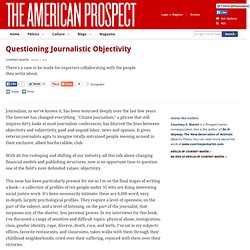
The Internet has changed everything. "Citizen journalism," a phrase that still inspires dirty looks at most journalism conferences, has blurred the lines between objectivity and subjectivity, paid and unpaid labor, news and opinion. It gives veteran journalists agita to imagine totally untrained people messing around in their exclusive, albeit hardscrabble, club. With all this reshaping and shifting of our industry, all this talk about changing financial models and publishing structures, now is an opportune time to question one of the field's most defended values: objectivity. This issue has been particularly present for me as I'm on the final stages of writing a book -- a collection of profiles of ten people under 35 who are doing interesting social justice work.
And I told them that I would show them drafts and give them a chance to give me feedback and correct inaccuracies before the pieces become public. Objectivity v Transparency - does journalism need a new ideology? What is the hallmark of good journalism?
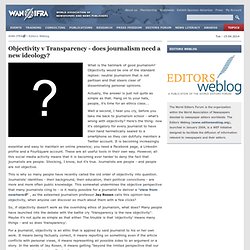
Objectivity would be one of the standard replies: neutral journalism that is not partisan and that steers clear of disseminating personal opinions. Actually, the answer is just not quite as simple as that. Hang on to your hats, people, it's time for an ethics class... Wait a second, I hear you cry, before you take me back to journalism school - what's wrong with objectivity? Martha Raddatz and the Faux Objectivity of Journalists. ABC journalist Martha Raddatz (Photo: Getty Images)Numerous commentators (including me) were complimentary of the performance of Martha Raddatz as the moderator of Wednesday night's vice presidential debate. She was assertive, asked mostly substantive questions, and covered substantial ground in 90 minutes. That's all true enough, but the questions she asked reveal something significant about American journalism in general and especially its pretense of objectivity.
For establishment journalists like Raddatz, "objectivity" is the holy grail. In their minds, it is what distinguishes "real reporters" from mere "opinionists" and, worse, partisans. As they tell it, this objectivity means they traffic only in straight facts, unvarnished by ideology or agenda. "Three things. Leave aside whether that is even a desirable mindset.
RADDATZ: Let's move to Iran. The US has Iran virtually encircled militarily. Objectivity (journalism) Journalistic objectivity is a significant principle of journalistic professionalism.
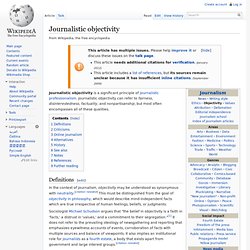
Journalistic objectivity can refer to fairness, disinterestedness, factuality, and nonpartisanship, but most often encompasses all of these qualities. Definitions[edit] Sociologist Michael Schudson argues that "the belief in objectivity is a faith in 'facts,' a distrust in 'values,' and a commitment to their segregation. www.bjr.libertar.org/index.php/bjr/article/viewFile/37/38. Rethinking Journalism Ethics, Objectivity in the Age of Social Media. In response to the rapidly changing media environment, many schools and academic programs are offering novel approaches to journalism education.
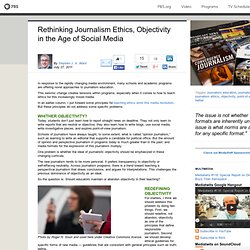
This seismic change creates tensions within programs, especially when it comes to how to teach ethics for this increasingly mixed media. In an earlier column, I put forward some principles for teaching ethics amid this media revolution. But these principles do not address some specific problems. Whither objectivity? Today, students don’t just learn how to report straight news on deadline. Schools of journalism have always taught, to some extent, what is called “opinion journalism,” such as learning to write an editorial that supports a candidate for political office.
One problem is whether the ideal of journalistic objectivity should be emphasized in these changing curricula. The new journalism tends to be more personal. So the question is: Should educators maintain or abandon objectivity in their teaching? Objectivity in Journalism. DAVID BROOKS There is some dispute about whether objectivity can really exist.

How do we know the truth? Well, I’m not a relativist on the subject. I think there is truth out there and that objectivity is like virtue; it's the thing you always fall short of, but the thing you always strive toward. And by the way, I think that opinion journalists have to be objective just as much as straight reporters. Opinion journalists, too, have to be able to see reality wholly and truly. What are the stages of getting to objectivity? The second stage is modesty. The same thing has to happen for journalists. The third stage of objectivity is the ability to process data — to take all the facts that you've accumulated and honestly process them into a pattern. The fourth stage of objectivity is the ability to betray friends. An Argument Why Journalists Should Not Abandon Objectivity.
In “Losing the News: The Future of the News that Feeds Democracy,” published by Oxford University Press, Alex S.
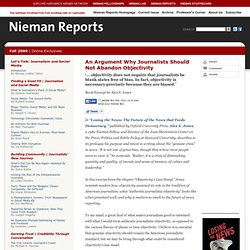
Jones, a 1982 Nieman Fellow and director of the Joan Shorenstein Center on the Press, Politics and Public Policy at Harvard University, describes in its prologue his purpose and intent in writing about the “genuine crisis” in news. The Myth of Objectivity in Journalism. By This page has been accessed since 29 May 1996.
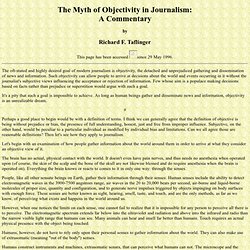
The oft-stated and highly desired goal of modern journalism is objectivity, the detached and unprejudiced gathering and dissemination of news and information. Such objectivity can allow people to arrive at decisions about the world and events occurring in it without the journalist's subjective views influencing the acceptance or rejection of information. Few whose aim is a populace making decisions based on facts rather than prejudice or superstition would argue with such a goal.